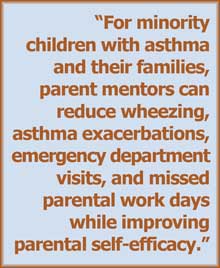Synopsis
An experimental program in Milwaukee that uses trained parent mentors to help other parents care for their young child's asthma led to a reduction in wheezing, asthma exacerbations, emergency room visits, and missed work days, while improving parents' competence in recognizing breathing problems that are controllable at home, all at a reasonable cost.

The Issue
Childhood asthma disproportionately affects minority children, who also experience higher rates of hospitalization and mortality than nonminority children. However, little is known about what interventions are effective for this population. This study examined the value of having parents of an asthmatic child receive specialized training to coach other parents on effective techniques for controlling their child's condition. The researchers grouped the families who participated in the parent mentor program into two categories: "high participants," who attended more than 25 percent of meetings with their mentors and completed more than 50 percent of phone interactions, and "low participants," who did not meet these criteria. These families were then compared with a control group that received regular asthma care.
Key Findings
- Children of parents who were in the high-participant group experienced significantly less wheezing, coughing, and difficulty breathing; children of low-participant parents had significant reductions only in coughing. Control-group patients experienced reductions in coughing and difficulty breathing.
- High-participant patients experienced significantly fewer exacerbations of their asthma and fewer missed school days, while parents missed fewer days of work attending to their sick children. These families also experienced a greater improvement in quality of life—including parents' ability to effectively control their child's serious breathing problems at home instead of the hospital—than did both low participants and control-group families.
- The average monthly cost of the intervention per patient was approximately $60. The high-participant group had savings of about $51 for asthma hospitalizations, $12 for emergency department visits, and $28 for missed work days. According to the author, the intervention resulted in "a total cost savings for the health care system of $597 per asthma exacerbation–free day gained for the intervention group."
Addressing the Problem
A parent mentoring program for minority children with asthma can significantly reduce symptoms, the need for emergency department visits, and the need for parents to take time off from work—all at a fairly reasonable cost and with net cost savings. Additional benefits of the intervention include providing job opportunities in underemployed communities and empowering underserved communities to address their children's health needs. The intervention, as well as similar mentoring programs for adults, may also be effective in reducing racial and ethnic disparities associated with other chronic conditions.
About This Study
Researchers compared the asthma outcomes of 112 minority children with asthma who received support from parent mentors with a control group of 108 children who received only traditional asthma care. The participants were enrolled between February 2004 and May 2007 after they visited hospitals and emergency departments in Milwaukee. After establishing a baseline assessment for all patients, the researchers tracked 10 asthma outcomes for both groups monthly using a telephone survey. Outcome measures included: frequency of asthma symptoms and exacerbations, asthma-related hospitalizations and emergency department visits, and scores on patient and caregiver quality-of-life inventories. Cost measures included direct program costs, direct medical costs, and indirect costs of missed work and school days. Parent mentors, who were recruited and specially trained, made an initial home visit, and then met monthly with assigned children and families at community centers. Monthly meetings included asthma education, peer support, meals, and presentations from asthma educators.
For more information about this program, or to order the free training CD-ROM, please visit: http://www4.utsouthwestern.edu/ParentMentor/.
Bottom Line
Using parent mentors can be a cost-effective way to reduce the disparities in asthma care experienced by minority children.